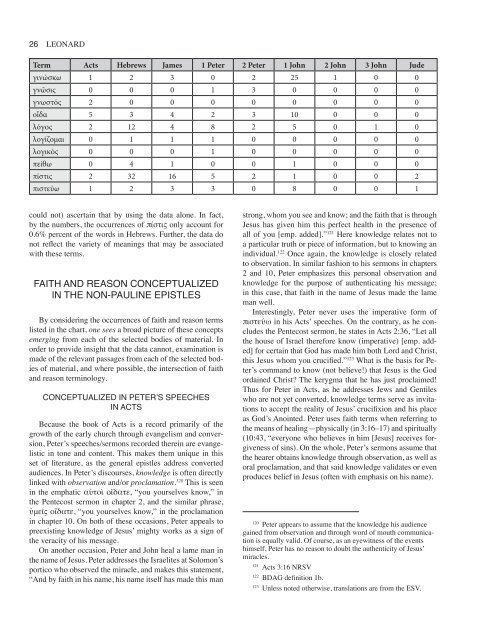kingdom-3-1
kingdom-3-1
kingdom-3-1
You also want an ePaper? Increase the reach of your titles
YUMPU automatically turns print PDFs into web optimized ePapers that Google loves.
26 LEONARD<br />
Term Acts Hebrews James 1 Peter 2 Peter 1 John 2 John 3 John Jude<br />
γινώσκω 1 2 3 0 2 25 1 0 0<br />
γνῶσις 0 0 0 1 3 0 0 0 0<br />
γνωστός 2 0 0 0 0 0 0 0 0<br />
οἶδα 5 3 4 2 3 10 0 0 0<br />
λόγος 2 12 4 8 2 5 0 1 0<br />
λογίζομαι 0 1 1 1 0 0 0 0 0<br />
λογικός 0 0 0 1 0 0 0 0 0<br />
πείθω 0 4 1 0 0 1 0 0 0<br />
πίστις 2 32 16 5 2 1 0 0 2<br />
πιστεύω 1 2 3 3 0 8 0 0 1<br />
could not) ascertain that by using the data alone. In fact,<br />
by the numbers, the occurrences of πίστις only account for<br />
0.6% percent of the words in Hebrews. Further, the data do<br />
not reflect the variety of meanings that may be associated<br />
with these terms.<br />
FAITH AND REASON CONCEPTUALIZED<br />
IN THE NON-PAULINE EPISTLES<br />
By considering the occurrences of faith and reason terms<br />
listed in the chart, one sees a broad picture of these concepts<br />
emerging from each of the selected bodies of material. In<br />
order to provide insight that the data cannot, examination is<br />
made of the relevant passages from each of the selected bodies<br />
of material, and where possible, the intersection of faith<br />
and reason terminology.<br />
CONCEPTUALIZED IN PETER’S SPEECHES<br />
IN ACTS<br />
Because the book of Acts is a record primarily of the<br />
growth of the early church through evangelism and conversion,<br />
Peter’s speeches/sermons recorded therein are evangelistic<br />
in tone and content. This makes them unique in this<br />
set of literature, as the general epistles address converted<br />
audiences. In Peter’s discourses, knowledge is often directly<br />
linked with observation and/or proclamation. 120 This is seen<br />
in the emphatic αὐτοὶ οἴδατε, “you yourselves know,” in<br />
the Pentecost sermon in chapter 2, and the similar phrase,<br />
ὑμεῖς οἴδατε, “you yourselves know,” in the proclamation<br />
in chapter 10. On both of these occasions, Peter appeals to<br />
preexisting knowledge of Jesus’ mighty works as a sign of<br />
the veracity of his message.<br />
On another occasion, Peter and John heal a lame man in<br />
the name of Jesus. Peter addresses the Israelites at Solomon’s<br />
portico who observed the miracle, and makes this statement,<br />
“And by faith in his name, his name itself has made this man<br />
strong, whom you see and know; and the faith that is through<br />
Jesus has given him this perfect health in the presence of<br />
all of you [emp. added].” 121 Here knowledge relates not to<br />
a particular truth or piece of information, but to knowing an<br />
individual. 122 Once again, the knowledge is closely related<br />
to observation. In similar fashion to his sermons in chapters<br />
2 and 10, Peter emphasizes this personal observation and<br />
knowledge for the purpose of authenticating his message;<br />
in this case, that faith in the name of Jesus made the lame<br />
man well.<br />
Interestingly, Peter never uses the imperative form of<br />
πιστεύω in his Acts’ speeches. On the contrary, as he concludes<br />
the Pentecost sermon, he states in Acts 2:36, “Let all<br />
the house of Israel therefore know (imperative) [emp. added]<br />
for certain that God has made him both Lord and Christ,<br />
this Jesus whom you crucified.” 123 What is the basis for Peter’s<br />
command to know (not believe!) that Jesus is the God<br />
ordained Christ? The kerygma that he has just proclaimed!<br />
Thus for Peter in Acts, as he addresses Jews and Gentiles<br />
who are not yet converted, knowledge terms serve as invitations<br />
to accept the reality of Jesus’ crucifixion and his place<br />
as God’s Anointed. Peter uses faith terms when referring to<br />
the means of healing—physically (in 3:16–17) and spiritually<br />
(10:43, “everyone who believes in him [Jesus] receives forgiveness<br />
of sins). On the whole, Peter’s sermons assume that<br />
the hearer obtains knowledge through observation, as well as<br />
oral proclamation, and that said knowledge validates or even<br />
produces belief in Jesus (often with emphasis on his name).<br />
120<br />
Peter appears to assume that the knowledge his audience<br />
gained from observation and through word of mouth communication<br />
is equally valid. Of course, as an eyewitness of the events<br />
himself, Peter has no reason to doubt the authenticity of Jesus’<br />
miracles.<br />
121<br />
Acts 3:16 NRSV<br />
122<br />
BDAG definition 1b.<br />
123<br />
Unless noted otherwise, translations are from the ESV.


